Our stories
On this page
INTERPOL/Europol
Tanya Smith, Investigative Analyst, INTERPOL-Ottawa

- What do you do in your job with INTERPOL Ottawa?
-
I conduct investigations and analyze reports. This information and intelligence stems from requests for assistance. The requests, through INTERPOL channels, cover all manner of criminal investigations, like:
- missing persons,
- public safety
- threat to life
I also research, collect, evaluate and analyze reports from Global Affairs Canada related to human rights practice. I prepare risk assessment reports and ensure that human rights conditions are respected.
A big part of my job also involves liaising and providing investigative advice and guidance to internal and external partners (both domestic and foreign). My advice covers a wide range of criminal investigation issues. I ensure the criminal investigations comply with INTERPOL standards and regulations.
As an acting supervisor, I manage and provide guidance to a team of analysts, assigning and reviewing files. I also:
- review and approve risk assessments
- organize and coordinate daily tasks
- handle more complex files, including issuance of INTERPOL Notices and high-profile cases
In February 2023, I had the opportunity to travel to the INTERPOL General Secretariat in Lyon, France with a group of coworkers. We learned more about INTERPOL's capabilities on an international scale. I was able to attend meetings and presentations with a number of different sections within INTERPOL's headquarters to learn more about what they do and what they can offer our National Central Bureau, like tools, assistance, etc.
These efforts will enhance our service delivery to Canadian and international partners.
- What does your job bring to you professionally? Personally?
-
I feel a sense of pride in the fact that I'm part of a great team at National Central Bureau Ottawa. As new policing challenges are constantly emerging, the work I do is important. It maintains connections and partnerships which are vital in combatting transnational crime.
While National Central Bureau Ottawa operates on shift work, the schedules are reasonable and provide a great balance with home/personal time.
No matter how much I think I know about my job and duties, I'm still able to learn something new everyday.
- What would you recommend to others who are interested in working in this position?
-
Be prepared for a big learning curve. It takes at least 6 months to be somewhat comfortable with the work involved.
It is not necessary to have a policing background to work as an Investigative Analyst. There are many civilian members and Public Service employees that work with me.
Bilingualism is an asset! Knowing more than English and French is not required, but it's a definite plus.
Sandra Belley, Acting Europol Coordinator, Europol
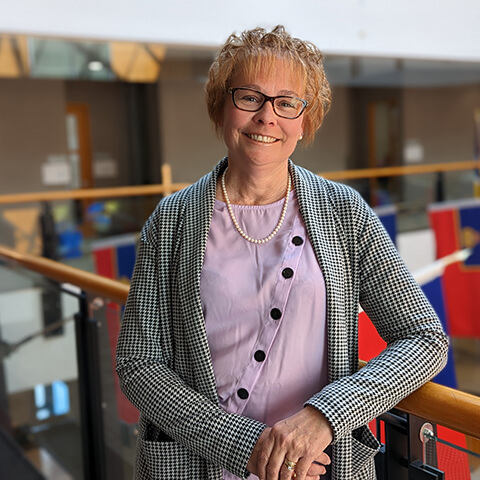
- What do you do with Europol?
-
I am a member of Canada's National Contact Point for Europol. I'm involved in:
- the daily triage and prioritization of all requests for assistance sent to and from Canada received via the Europol web-based platform, Secure Information Exchange Network Application, also known as SIENA
- working with our RCMP Liaison Officers and domestic and international law enforcement partners
- providing direct investigative research and analytical services on criminal investigation matters coming from Europol member countries and over 300 Canadian law enforcement agencies and police services
- delivery of Secure Information Exchange Network Application training sessions to RCMP end users
This year, the National Contact Point team traveled to The Hague to partake in a study tour. The tour allowed me to meet with some of Europol Subject Matter Experts. This in-person experience was beneficial to the growth of my recognition and familiarity to some of Europol's operations, while providing a valuable prospect to the expansion to the European Union Subject Matter Expert network.
- What does your job bring to you professionally? Personally?
-
Professionally, my job provides me with daily exposure to new challenges. This exposure allows for growth and development, including the understanding of the laws, policies and procedures under Canada's legislative framework.
Personally, I feel good knowing that I actively contribute to the important work of Canada and its European partners who investigate the criminal activities related to transnational organized crime groups and/or individuals.
- What is the greatest thing you have learned in this position?
-
I learned about the importance of collaborating with our international law enforcement partners. Today's technological advancements are exploited by organized crime groups providing them with the ability to expand their illicit activities past territorial boundaries. Establishing collaboration, when permissible, under Canada's various policies and regulations can help deter these activities.
The best good news story is when you see this collaboration between Law Enforcement Agencies. As an investigative support analyst to the National Contact Point, I aided with an assistance request from the United Kingdom to apprehend a fugitive believed to be in the Vancouver Lower Mainland. We shared the intelligence with our border officials enabling them to confirm that the fugitive had entered Canada. Police of jurisdiction was engaged. Their investigation determined the fugitive was recorded on an outgoing passenger manifest. A few days later, our border officials apprehended the fugitive based on inadmissibility to Canada due to an immigration violation. The subject was deported back to the United Kingdom following a detention hearing.
Liaison officers
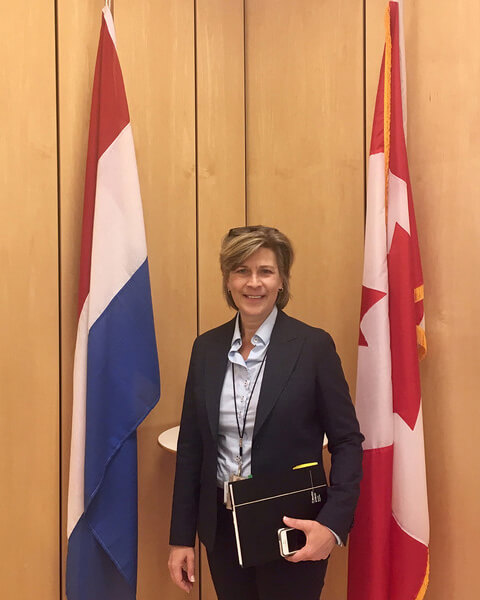
Nancy Mason, Senior Liaison Officer, The Hague, Netherlands
- What do you do as part of the Liaison Officer program?
-
Liaison officers are channels between Canadian law enforcement units and foreign police authorities. The liaison officers help through face-to-face interactions with our international partners. I work in The Hague. We have 26 countries in our area of responsibility. So maintaining the network of partnerships developed is important.
On any given day, I help with investigations. Some involve murder, drugs and money laundering, public safety and cyber related crimes. Recently, another Liaison Officer and I helped with an International Controlled Delivery for a foreign police partner. Really, there's never a dull day.
- What does your work bring to you personally? Professionally?
-
I'm proud to be part of combating transnational criminal activity with our partners. The job brings huge personal satisfaction, knowing that you've accomplished something or solved a mystery. There is significant gratitude as well from both Canadian and foreign police agencies.
For me, the greatest thing I've learned has been the importance of our communication skills. We can have a tendency to become complacent in how we get along with each other. This usually occurs when working in familiar teams or working environments. Communication and diplomacy is critical to success as a Liaison Officer.
- Have you participated in any tasks or projects that support innovative ways of thinking or innovative uses of technology?
-
I learned that the Dutch are skilled in technological investigations. Their National Police work closely with Canadian investigators and other foreign partners.
The RCMP will travel to The Netherlands to learn about the Dutch's implementation of their police mobile applications. They're using a "connected cop" application as a messaging and dispatching tool. If we chose to integrate a similar tool, this will help support the RCMP Digital Strategy.
Capacity building

Sergeant Adrienne Vickery, International Capacity Building and Training
- What was your role in International Capacity Building and Training?
-
I designed and delivered a five-day course on money laundering. This course was tailored for police officers, investigators and Crown counsel in Kingston, Jamaica. It promoted international cooperation and information sharing between Canada and Jamaica.
I also trained the participants how to investigate cryptocurrency crime. The cryptocurrency landscape is complex and all law enforcement authorities have to be ready to tackle the serious challenges of this type of crime.
- What is the greatest thing you have learned from this unique position?
-
It's important to share knowledge, best practices, and lessons learned with other countries. It helps build a global economy where we can identify and prevent the misuse of our financial system.
I welcomed the chance to meet financial investigators in a foreign country. I also expanded my own knowledge and skills, and shared what I learned with my colleagues in Canada.
Women remain the minority in law enforcement but nearly half of the Jamaican course participants were female. Not only were these women strong and capable, but they fought hard to break through gender-based stereotypes to get there.
- What is some advice you would offer to someone considering an opportunity with International Capacity Building and Training?
- International capacity building is a unique and rewarding opportunity. The reception we received overwhelmed me. The candidates were honoured to attend a course prepared and delivered by the RCMP. This demonstrated Canada's strong international reputation and the impact of the RCMP on international capacity building. To be able to represent the RCMP and women in law enforcement was empowering and an experience I will never forget.
Peacekeeping
Inspector Blayr Schmidt, Contingent Commander - Canadian Police Mission in Ukraine
- What is your strength?
-
As a response to new ideas I try to always start with "yes, and…". There are way too many easy ways to say "no". It would be easier. It would be faster. It would be less work. Starting with "yes, and…" allows ideas to grow, people to be heard and to build ownership and responsibility for the next steps.
And…I'm tenacious. Not getting discouraged by the work or challenges that come with building a program or making change. You need to have the drive to continue to persevere when obstacles, processes or hurdles arise. Not giving up on those goals and continuing to lean into them by doing the work is where my team and I thrive.
- What is your story?
- Growing up in Saskatchewan, I always wanted to be a Mountie. I wanted to see the world and experience everything the Force had to offer. I mounted out of "F" Division and was excited for my first post of Dillon - Buffalo River Dene Nation. It was an adventure and truly set the stage for the member I have become. Then it was on to Fort Qu'Appelle, Southern Enforcement Response Team and Regina CFSEU. I was fortunate to work alongside many wonderful detachment members and specialized sections in "F" Div to then be able to bring my operational knowledge to NHQ. In Ottawa, I worked in the Covert Operations Branch, National Intelligence and was tasked with supporting the organization in responding to the Public Order Emergency Commission.
- What is your take on international deployments?
- I am honored to have been selected to grow an incredible team of Canadian Police officers as we rebuild our training mission in Ukraine! It's been a humbling experience to work alongside Ukrainian and Canadian police officers during such a dynamic and challenging time. As I approach my 23rd year of service, I continue to be delighted with the diverse opportunities within the Canadian policing landscape, and the incredible expertise displayed by police officers across our organization and our country - this is truly our strength as Canadian Police!
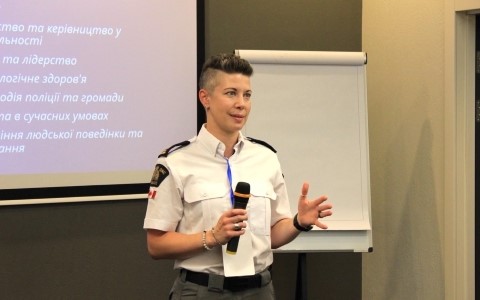
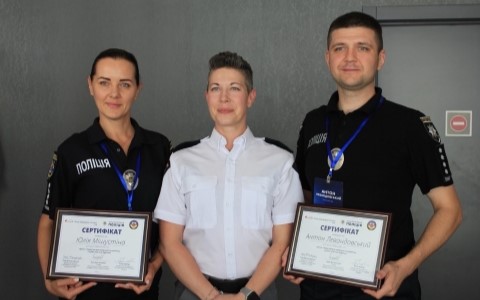
Superintendent Rabih Abdallah, Director of International Peace Operations
- What enticed you to apply for this Director position?
-
I've always had an interest in international affairs, having had a unique upbringing may have had something to do with it. I was born in Lebanon and grew up during the civil war. My family moved to Nova Scotia, Canada when I was 17 years old. I completed my Bachelor of Arts in International Development Studies as well as a Master of Arts in Human Security and Peace Building. Further interest in international police work grew with my time in the RCMP. I was fortunate to deploy abroad in a variety of functions including security sector reform, bi-lateral training mission, a United Nations mission, extra-territorial investigations and as the RCMP Liaison Officer in Rabat Morocco for four years. Seeing the opportunity to support the International Peace Operations Program, I had to take it.
- What are some of your previous accomplishments that will help with peace operations moving forward?
-
In 2008 and 2009, I worked for the United Nations International Independent Investigation Commission in Beirut. I helped investigate the assassination of former Lebanese Prime Minister Rafiq Hariri. I was the first RCMP member to work on this high-profile investigation. My role included the collection and sharing of information, setting up a process to protect the identity and to safeguard key witnesses. I also interviewed several convicted terrorists in Lebanese jails. This was a rare opportunity that provided me with great insight into terrorist activities. The work took place in a very dangerous environment during an unsafe period. However, the knowledge and experience gained were tremendous and have helped me contribute better to the needs of the RCMP in matters of National Security.
As the RCMP Liaison Officer in Rabat, Morocco from 2011 to 2015, I had to respond to operational requirements in very challenging environments requiring extensive travel throughout West and Central Africa. The results of these efforts, while sometimes frustrating, were very rewarding. The release of a Canadian hostage, kidnapped by Boko Haram, was a great victory. I am proud of the tremendous efforts that I and other colleagues, both within the RCMP and in other Government Departments, put into the case. Another challenging accomplishment was an investigation into illegal migration. Over a period of three years, I worked with colleagues and members of other Government Departments along with regional law enforcement partners to stop three separate illegal migrant ventures out of West Africa destined to Canada.
Having had jobs all over the RCMP, within the divisions, at headquarters, and around the world, I believe my experience brings a diverse perspective to peace operations. I'm eager to lead this important Program into a new era of International peace and stabilization missions that will enhance global security and hopefully, by extension, help reduce criminal activity at home in Canada.

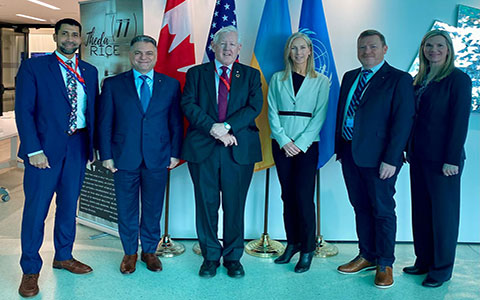
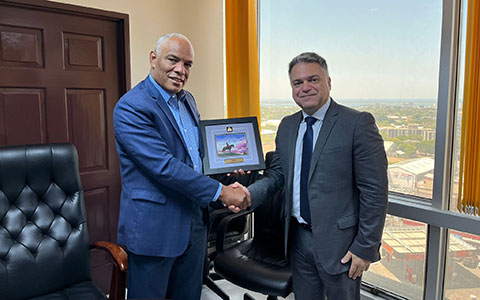
Sergeant Maryse Robert, Technical Assistance Mission, Haiti
- What did you do as part of your mission?
-
For just over three months, I led the Haiti Field Unit as part of the Technical Assistance Mission. This is an auxiliary/ancillary mission under the Canadian Police Arrangement. The Haiti Field Unit feeds into the Canadian Interdepartmental Task Force. This task force provides support to the International Security Assistance Coordination Group, a large network comprised of 26 countries and different United Nations development units and organizations. It is chaired by the Government of Canada.
During my time on this specialized mission, I liaised mainly with the Haitian National Police. My purpose was to gather their specific needs for equipment, gather technical data, and discus their needs for training. Networking was important, as it was used not only to maintain discussions but also to share ideas, and find the best suitable solution on specific needs. We needed to set up a two-way discussion to have the Haitian National Police tell us what they needed for equipment and training for them to function as a Police Force. It was a change for the Haitian National Police to have that discussion on technical data and the reasoning behind a need.
- What did your work in mission bring to you personally? Professionally?
-
I took a very strong leadership role and improved my communication skills. By the end of my mission, I was more self-confident. This increased self-confidence helped when I worked closely with a colleague from the Canadian Armed Forces, as well as with personnel from Global Affairs Canada, both in Canada and Haiti. Additionally, my networking skills improved immensely.
Canada has always helped out Haiti and especially the Haitian National Police over the years. But it was never done in the way that we're doing now. We're sending police officers in theatre to have discussions at the management and operational levels with the Haitian National Police. We're focused on the problem resolution. I'm proud to say that we've advanced in this objective and earned respect from the Haitian National Police, as well as with the international community.
- Is there something inspirational from your mission?
-
I liaised with the Haitian National Police and the international community. One of my main points of contact was an Inspector General from the Haitian National Police (upper management level). We built a very strong relationship during my deployment. When I departed, I gave him an RCMP pen to thank him for his assistance. He was very touched by the small gift because he admires the RCMP. He had received help from the RCMP when he was younger. The RCMP helped him develop his manager and leadership skills. He will retire soon and he explained to me that he will finish his career with a strong RCMP relationship, the same way his career started.
I admire the Haitian National Police officers. They are under staffed, under equipped, but still come to work everyday. They are resilient and brave to face the challenges and dangerous missions against the armed gangs. It is very inspirational to see them going to work every day and accomplish their work with the goal of making their country better. And I'm grateful to be helping them achieve this goal.

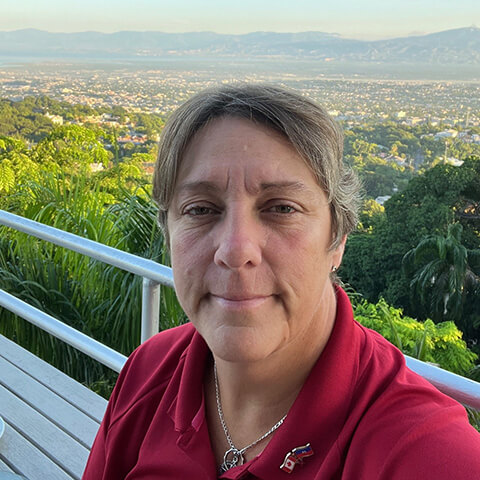
Sergeant Caroline Duval, Training Officer, United Nations Pre-Selection Assistance and Assessment Team in Zambia
- What kind of deployment did you take part in?
-
I was part of a team of five Canadian police officers from various police partner agencies. We deployed to Zambia for two weeks to deliver United Nations Pre-Selection Assistance and Assessment Team training. This time was spent conducting a preparatory training course for Zambian women police officers to help them successfully apply to United Nations peace operations missions. I was an instructor within an amazing team. I taught all aspects of the preparatory training, including:
- English oral and written comprehension,
- computer proficiency,
- driving skills, and
- firearms proficiency.
- How is this training benefiting the police involved, in this case in Zambia?
-
This course is first and foremost for women only. It gives them training and practice to prepare them to pass their "Assessment for Mission Service", a test required for all police officers wishing to participate in United Nations peacekeeping missions. In the end, this improves their chances to be deployed to an international mission with the United Nations.
Not only that, but the Zambian Police organization as a whole is benefiting from this training. These women will return to their regular duties and will share their new skills with their colleagues. Also, we had the pleasure of working with their firearms and driving instructors. They have also learned from us. So, in turn, they may use this new knowledge to train their own Zambian recruits and gain more experienced police officers.
- What did your work with this deployment bring to you personally? Professionally?
-
Personally, I would say this has provided me with an unbelievable opportunity to give back and to empower these women. There are countries where women would usually not have had a chance to undergo this training and receive this level of instructions. I feel quite lucky to have been chosen for this task. It's really gratifying.
Professionally, I believe it is reinforcing that there are many ways to learn. We need to adjust our teaching methods to our students/candidates. Also, it has opened my eyes even wider to the differences around the world. We have so much knowledge to share with each other. And this makes us better, more well-rounded police officers.
I have learned to embrace differences. The Zambians are so welcoming, to the point where all of us were given a Zambian name from very early on in the training. Mine was Namasico, which means "born in the evening." I have also learned so much more about United Nations missions from my colleague instructors, as I was the only one that had never deployed in a mission before. Who knows, maybe a full deployment is in my future!


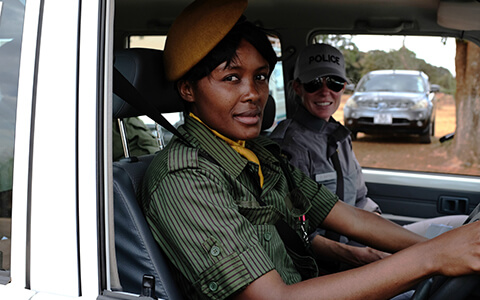
- Date modified: